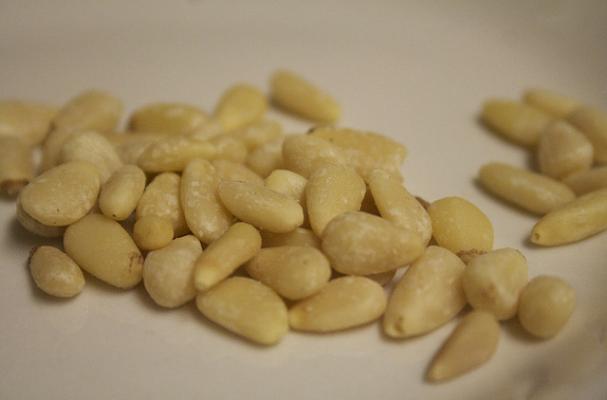
Pine nuts, not actually nuts but seeds, are an increasingly popular delicacy. While they may not rank on the same list as caviar or truffles, the multi-billion dollar industry has been struggling to keep up with consumer demands. A key ingredient in pesto, as well as a popular snackfood, pine nuts (aka pignolas) have been causing quite a fuss.
Over the past few years, complaints of an inexplicable and persistent metallic taste after ingesting pine nuts has become an international phenomenon and sparked investigations of so-called Pine Nut Syndrome (PNS) or "pine mouth". Medically, PNS is marked by a single symptom: metallogeusia, a specific type of taste distortion associated with a metallic overtone, and usually strikes within 48 hours of ingesting the crunchy seeds. The sufferer's will be plagued with a seemingly inexplicable metallic taste and anything eaten subsequently will taste bitter and tin-like. Individuals suffering from PNS can experience symptoms for up to 10 weeks, certainly not something to laugh about.
"All foods have a bitter flavour," said Larry Stefan in an interview with the <a href="http://www.vancouversun.com/health/Rogue+pine+nuts+spoil+your+appetite+weeks/4737712/story.html">Vancouver Sun</a>, "If you breathe through your mouth, the air tastes foul. It's a bitch." Stefan, an avid wine collector, could not even enjoy a glass of good red after eating pine nuts on a salad two weeks ago. Since the onset of PNS, Stefan has reportedly lost several pounds and "simply cannot eat because everything tastes so horrible."
While complaints have been on the rise for the past decade, a <a href="http://www.hindawi.com/journals/jt/2011/316789/">recent report</a> (Jan. 2011) from the Journal of Medical Toxicology indicates that Chinese pine nuts could be to blame. Ordinarily, the southern Chinese White or Huashan Pine (<i>Pinus armandii</i>) had only been used for lumber, resin and turpentine production. However, in recent years, the growing international demand for pine nuts has lead to harvesting from a whole host of new varieties of pine trees - including <i>P. armandii</i>.
PNS and specifically <i>P. armandii</i>, are actively under investigation by the <a href="http://www.food.gov.uk/">UK Food Standards Agency</a>, to interesting ends: the European Commission has labeled these seeds "unfit for human consumption" and new regulations have been implemented by the Chinese government. The <a href="http://www.nutfruit.org/">International Nut and Dried Fruit Council</a>, in conjunction with a Chinese delegation represented by the Heads of the Chinese Chamber of Commerce for Import & Export of Foodstuffs, Native Products and Animal By-Products (CCCFNA), <a href="http://www.nutfruit.org/UserFiles/Image/pdf/chinese_pinenuts.pdf">announced last month</a> that China has committed to a new set of regulations concerning the export of pine nuts. Namely, that the <i>P. armandii</i> variety is to be excluded from future export into EU Member States.
So where does the US stand on this? Well, in a nutshell (or is that a pinecone?), the answer is: nothing. According to the <a href="http://www.fda.gov/Food/ResourcesForYou/Consumers/ucm247099.htm">FDA</a> on March 14th, 2011: "The FDA continues to analyze consumer complaints to identify the potential causes of "pine mouth" and to determine whether the severity of symptoms and likelihood of developing them is related to the amount of pine nuts consumed. FDA will continue to monitor this problem and keep the public posted regarding any new findings." Well, I guess that takes care of that.
Photo by <a href="http://www.flickr.com/photos/kona99/4303910402/in/photostream/">kona99</a>.










